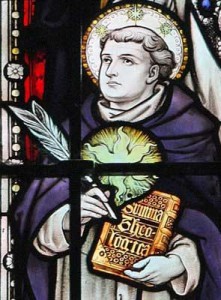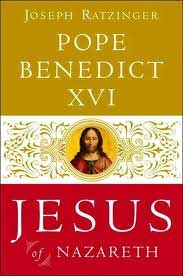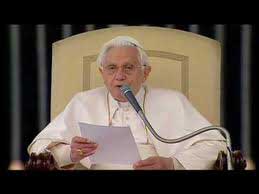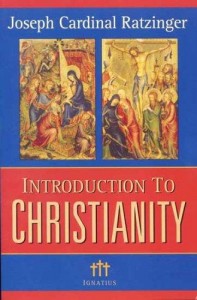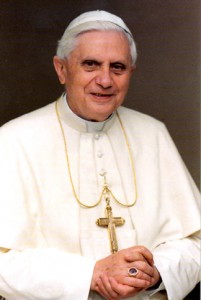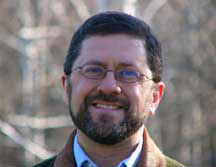 January 28 is the day the Catholic Church honors St. Thomas Aquinas. The Italian saint was a priest and is widely recognized as being one of the most influential figures in the study of theology. Here we have more on St. Thomas Aquinas from Mike Aquilina who he refers to as the “poet laureate of heaven”.
January 28 is the day the Catholic Church honors St. Thomas Aquinas. The Italian saint was a priest and is widely recognized as being one of the most influential figures in the study of theology. Here we have more on St. Thomas Aquinas from Mike Aquilina who he refers to as the “poet laureate of heaven”.
[powerpress]
Check out  Mike’s wonderful site “The Way of the Fathers”
From the Pope Benedict’s audience (from Vatican.va) reflecting on St. Thomas Aquinas….
 The life and teaching of St Thomas Aquinas could be summed up in an episode passed down by his ancient biographers. While, as was his wont, the Saint was praying before the Crucifix in the early morning in the chapel of St Nicholas in Naples, Domenico da Caserta, the church sacristan, overheard a conversation. Thomas was anxiously asking whether what he had written on the mysteries of the Christian faith was correct. And the Crucified One answered him: “You have spoken well of me, Thomas. What is your reward to be?”. And the answer Thomas gave him was what we too, friends and disciples of Jesus, always want to tell him: “Nothing but Yourself, Lord!”
Mike’s book that really helps to pray with St. Thomas you can find it here
This is the poem spoke about in our conversaton:
O Godhead hid, devoutly I adore Thee,
Who truly art within the forms before me;
To Thee my heart I bow with bended knee,
As failing quite in contemplating Thee.
Sight, touch, and taste in Thee are each deceived;
The ear alone most safely is believed.
I believe all the Son of God has spoken :
Than Truth’s own word there is no trucer token.
God only on the Cross lay hid from view,
But here lies hid at once the manhood too :
And I, in both professing my believe,
Make the same prayer as the repentant thief.
Thy wounds, as Thomas saw, I do not see;
Yet Thee confess my Lord and God to be.
Make me blieve Thee ever more and more,
In Thee my hope, in Thee my love to store.
O Thou, memorial of our Lord’s own dying!
O living bread, to mortals life supplying!
Make Thou my soul henceforth on Thee to live;
Ever a taste of heavenly sweetness give.
O loving Pelican! O Jesu Lord!
Unclean I am, but cleanse me in Thy Blood :
Of which a single drop, for sinners spilt,
Can purge the entire world from all its guilt.
Jesu! whom for the present veiled I see,
What I so thirst for, oh, vouchasafe to me :
That I may see Thy countenance unfolding,
And may be blest Thy glory in beholding. Amen.
Tags: disciples, mike aquilina, pope benedict, thomas aquinas
This entry was posted on Wednesday, January 28th, 2015 at 2:54 am
You can follow any responses to this entry through the RSS 2.0 feed.
Vatican City, Sep 15, 2010 Pope Benedict’s General Audience, from Vatican.va
Saint Clare of Assisi
Dear Brothers and Sisters,
One of the best loved Saints is without a doubt St Clare of Assisi who lived in the 13th century and was a contemporary of St Francis. Her testimony shows us how indebted the Church is to courageous women, full of faith like her, who can give a crucial impetus to the Church’s renewal.
So who was Clare of Assisi? To answer this question we possess reliable sources: not only the ancient biographies, such as that of Tommaso da Celano, but also the Proceedings of the cause of her canonization that the Pope promoted only a few month after Clare’s death and that contain the depositions of those who had lived a long time with her.
Born in 1193, Clare belonged to a wealthy, aristocratic family. She renounced her noble status and wealth to live in humility and poverty, adopting the lifestyle that Francis of Assisi recommended. Although her parents were planning a marriage for her with some important figure, as was then the custom, Clare, with a daring act inspired by her deep desire to follow Christ and her admiration for Francis, at the age of 18 left her family home and, in the company of a friend, Bona di Guelfuccio, made her way in secret to the Friars Minor at the little Church of the Portiuncula. It was the evening of Palm Sunday in 1211. In the general commotion, a highly symbolic act took place: while his companions lit torches, Francis cut off Clare’s hair and she put on a rough penitential habit. From that moment she had become the virgin bride of Christ, humble and poor, and she consecrated herself totally to him. Like Clare and her companions, down through history innumerable women have been fascinated by love for Christ which, with the beauty of his Divine Person, fills their hearts. And the entire Church, through the mystical nuptial vocation of consecrated virgins, appears what she will be for ever: the pure and beautiful Bride of Christ.
In one of the four letters that Clare sent to St Agnes of Prague the daughter of the King of Bohemia, who wished to follow in Christ’s footsteps, she speaks of Christ, her beloved Spouse, with nuptial words that may be surprising but are nevertheless moving: “When you have loved [him] you shall be chaste; when you have touched [him] you shall become purer; when you have accepted [him] you shall be a virgin. Whose power is stronger, whose generosity is more elevated, whose appearance more beautiful, whose love more tender, whose courtesy more gracious. In whose embrace you are already caught up; who has adorned your breast with precious stones… and placed on your head a golden crown as a sign [to all] of your holiness” (First Letter to Blessed Agnes of Prague: FF,2862).
Especially at the beginning of her religious experience, Francis of Assisi was not only a teacher to Clare whose teachings she was to follow but also a brotherly friend. The friendship between these two Saints is a very beautiful and important aspect.
Indeed, when two pure souls on fire with the same love for God meet, they find in their friendship with each other a powerful incentive to advance on the path of perfection. Friendship is one of the noblest and loftiest human sentiments which divine Grace purifies and transfigures.
Like St Francis and St Clare, other Saints too experienced profound friendship on the journey towards Christian perfection. Examples are St Francis de Sales and St Jane Frances de Chantal. And St Francis de Sales himself wrote: “It is a blessed thing to love on earth as we hope to love in Heaven, and to begin that friendship here which is to endure for ever there. I am not now speaking of simple charity, a love due to all mankind, but of that spiritual friendship which binds souls together, leading them to share devotions and spiritual interests, so as to have but one mind between them” (The Introduction to a Devout Life, III, 19).
After spending a period of several months at other monastic communities, resisting the pressure of her relatives who did not at first approve of her decision, Clare settled with her first companions at the Church of San Damiano where the Friars Minor had organized a small convent for them. She lived in this Monastery for more than 40 years, until her death in 1253. A first-hand description has come down to us of how these women lived in those years at the beginning of the Franciscan movement. It is the admiring account of Jacques de Vitry, a Flemish Bishop who came to Italy on a visit. He declared that he had encountered a large number of men and women of every social class who, having “left all things for Christ, fled the world. They called themselves Friars Minor and Sisters Minor [Lesser] and are held in high esteem by the Lord Pope and the Cardinals…. The women live together in various homes not far from the city. They receive nothing but live on the work of their own hands. And they are deeply troubled and pained at being honoured more than they would like to be by both clerics and lay people” (Letter of October 1216:Â FF, 2205, 2207).
Jacques de Vitry had perceptively noticed a characteristic trait of Franciscan spirituality about which Clare was deeply sensitive: the radicalism of poverty associated with total trust in Divine Providence. For this reason, she acted with great determination, obtaining from Pope Gregory IX or, probably, already from Pope Innocent III, the so-called Privilegium Paupertatis (cf. FF.,3279). On the basis of this privilege Clare and her companions at San Damiano could not possess any material property. This was a truly extraordinary exception in comparison with the canon law then in force but the ecclesiastical authorities of that time permitted it, appreciating the fruits of evangelical holiness that they recognized in the way of life of Clare and her sisters. This shows that even in the centuries of the Middle Ages the role of women was not secondary but on the contrary considerable. In this regard, it is useful to remember that Clare was the first woman in the Church’s history who composed a written Rule, submitted for the Pope’s approval, to ensure the preservation of Francis of Assisi’s charism in all the communities of women large numbers of which were already springing up in her time that wished to draw inspiration from the example of Francis and Clare.
In the Convent of San Damiano, Clare practised heroically the
virtues that should distinguish every Christian: humility, a spirit of piety and penitence and charity. Although she was the superior, she wanted to serve the sick sisters herself and joyfully subjected herself to the most menial tasks. In fact, charity overcomes all resistance and whoever loves, joyfully performs every sacrifice. Her faith in the Real Presence of Christ in the Eucharist was so great that twice a miracle happened. Simply by showing to them the Most Blessed Sacrament distanced the Saracen mercenaries, who were on the point of attacking the convent of San Damiano and pillaging the city of Assisi.
Such episodes, like other miracles whose memory lives on, prompted Pope Alexander IV to canonize her in 1255, only two years after her death, outlining her eulogy in the Bull on the Canonization of St Clare. In it we read: “How powerful was the illumination of this light and how strong the brightness of this source of light. Truly this light was kept hidden in the cloistered life; and outside them shone with gleaming rays; Clare in fact lay hidden, but her life was revealed to all. Clare was silent, but her fame was shouted out” (FF, 3284). And this is exactly how it was, dear friends: those who change the world for the better are holy, they transform it permanently, instilling in it the energies that only love inspired by the Gospel can elicit. The Saints are humanity’s great benefactors!
St Clare’s spirituality, the synthesis of the holiness she proposed is summed up in the fourth letter she wrote to St Agnes of Prague. St Clare used an image very widespread in the Middle Ages that dates back to Patristic times: the mirror. And she invited her friend in Prague to reflect herself in that mirror of the perfection of every virtue which is the Lord himself. She wrote: “Happy, indeed, is the one permitted to share in this sacred banquet so as to be joined with all the feelings of her heart (to Christ) whose beauty all the blessed hosts of the Heavens unceasingly admire, whose affection moves, whose contemplation invigorates, whose generosity fills, whose sweetness replenishes, whose remembrance pleasantly brings light, whose fragrance will revive the dead, and whose glorious vision will bless all the citizens of the heavenly Jerusalem, because the vision of him is thesplendour of everlasting glory, the radiance of everlasting light, and a mirror without tarnish. Look into this mirror every day, O Queen, spouse of Jesus Christ, and continually examine your face in it, so that in this way you may adorn yourself completely, inwardly and outwardly…. In this mirror shine blessed poverty, holy humility, and charity beyond words…” (Fourth Letter to Blessed Agnes of Prague, FF, 2901-2903).
Grateful to God who give us Saints who speak to our hearts and offer us an example of Christian life to imitate, I would like to end with the same words of Blessing that St Clare composed for her Sisters and which the Poor Clares, who play a precious role in the Church with their prayer and with their work, still preserve today with great devotion. These are words in which the full tenderness of her spiritual motherhood emerges: “I give you my blessing now while living, and after my death, in as far as I may: nay, even more than I may, I call down on you all the blessings that the Father of mercies has bestowed and continues to bestow on his spiritual sons and daughters both in Heaven and on earth, and with which a spiritual father and mother have blessed and will bless their spiritual sons and daughters. Amen” (FF, 2856).
Tags: catholic, catholic podcast, catholic prayer, cathollc spirituality, Clare of Assisi, pope benedict, pope benedict xvi, Saint Clare of Assisi, st clare of assisi, women of the middle ages
This entry was posted on Monday, August 11th, 2014 at 11:02 am
You can follow any responses to this entry through the RSS 2.0 feed.
“Be Saints!  An invitation from Pope Benedict XVI”, edited by Amy Welborn and illustrated by Ann Engelhart is simply wonderful, a  must for every family library.  Marvelous for children and adults alike, this compilation is taken from the talks given by Pope Benedict to children during his 2010 visit to England.  In this conversation with Ann Engelhart, we discuss this work.  We  also discuss the nature of art and beauty, in particular for children, and it’s ability to evangelize.
must for every family library.  Marvelous for children and adults alike, this compilation is taken from the talks given by Pope Benedict to children during his 2010 visit to England.  In this conversation with Ann Engelhart, we discuss this work.  We  also discuss the nature of art and beauty, in particular for children, and it’s ability to evangelize.
[powerpress]
 You can find the book here
You can find the book here
From the description:
In this very colorful book by acclaimed artist Ann Englehart, the Pope’s words come to life as he interacts with the children, showing all children how only God can satisfy the deepest needs of our hearts.
Interspersed are prayers and quotes from various saints including Saint Francis, Saint Ignatius, Mother Teresa, St. Paul, St. Peter and more. They all emphasize that the most important thing we can become in this life is a Saint, a true friend of Jesus.
Tags: amy welborn, Ann Engelhart, children, ignatius press, pope benedict
This entry was posted on Thursday, December 20th, 2012 at 12:39 pm
You can follow any responses to this entry through the RSS 2.0 feed.
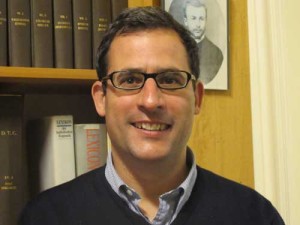 On October11, 2012,  I began recording a new series that will soon begin airing on Discerning Hearts with Dr. Adrian Walker, which we recorded at “Casa Balthasar“,  a house of discernment for men located in Rome, Italy, where he was offering instruction.  Adrian served as the English translator of Pope Benedict XVI’s  book “Jesus of Nazareth” . With  the historic events occurring with the Synod on the New Evangelization and start of the Year of Faith, we took some time aside to discuss that work and the influence of our Holy Father.
On October11, 2012,  I began recording a new series that will soon begin airing on Discerning Hearts with Dr. Adrian Walker, which we recorded at “Casa Balthasar“,  a house of discernment for men located in Rome, Italy, where he was offering instruction.  Adrian served as the English translator of Pope Benedict XVI’s  book “Jesus of Nazareth” . With  the historic events occurring with the Synod on the New Evangelization and start of the Year of Faith, we took some time aside to discuss that work and the influence of our Holy Father.
[powerpress]
You can find the book here
The Casa, located in Rome, was founded in 1990 by a group of friends  and is 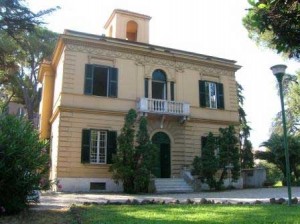 directed by Rev. Jacques Servais, S.J.;  Joseph Ratzinger (Pope Benedict XVI) has been closely associated with the Casa Balthasar from the very beginning as its Cardinal Protector.
directed by Rev. Jacques Servais, S.J.;  Joseph Ratzinger (Pope Benedict XVI) has been closely associated with the Casa Balthasar from the very beginning as its Cardinal Protector.
Tags: Adrian Walker, holy father, Italy, pope benedict
This entry was posted on Wednesday, October 24th, 2012 at 12:24 am
You can follow any responses to this entry through the RSS 2.0 feed.
Vatican City, 2 May 2012 (VIS) – 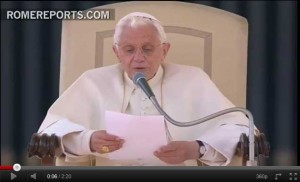
The prayer of St. Stephen, the first Christian martyr, was the theme of the Holy Father’s catechesis during his general audience this morning.
Addressing more than 20,000 faithful filling St. Peter’s Square, the Pope explained how, according to the narrative of the Acts of the Apostles, Stephen was taken before the Sanhedrin accused of having declared that Jesus would destroy the Temple and change the customs handed down by Moses. In his address before the council Stephen explained that, in saying these things, Jesus had been referring to His body, which was the new temple. In this way, Christ “inaugurated the new worship and, with the offer of Himself on the cross, replaced the ancient sacrifices”, Benedict XVI said.
Stephen wished to show that the accusation of subverting the Law of Moses was unfounded, to which end he outlined his view of the history of salvation, of the covenant between God and man. “Thus”, the Holy Father explained, “he reread the entire biblical narrative to show that it led to the ‘place’ of God’s definitive presence, which is Jesus Christ and in particular His passion, death and resurrection. Stephen interpreted his status as a disciple of Jesus in the same light, … following Him to martyrdom. Thus, meditation upon Sacred Scripture helped him to understand … the present”.
“In his meditation upon God’s action in the history of salvation” the proto-martyr “highlighted the perennial temptation to reject God and His acts, and affirmed that Jesus is the Just One announced by the prophets. In Him, God made Himself definitively and uniquely present: Jesus is the ‘place’ of true worship”.
Stephen’s explanations and his life were interrupted by his stoning, yet “martyrdom was the culmination of his life and message, because he became one with Christ. Thus his meditation upon the action of God in history, on the divine Word which was entirely fulfilled in Jesus, became a form of participation in Christ’s prayer on the cross”.
The moment of Stephen’s martyrdom “again revealed the fruitful relationship between the Word of God and prayer”, the Pope said. Yet “where did this first Christian martyr find the strength to face his persecutors and to make the ultimate gift of self? The answer is simple: in his relationship with God, in his communion with Christ, in meditating upon the history of salvation, in witnessing the action of God which reached its apex in Jesus Christ”.
St. Stephen believed that Jesus was “the Temple, ‘not made by human hands’, in which the presence of God the Father came so close as to enter our human flesh, bringing us to God and opening the doors of heaven for us. Our prayer must, then, be contemplation of Jesus sitting at the right hand of God, of Jesus as Lord of our daily life. In Him, under the guidance of the Holy Spirit, we too can address God … with the trust and abandonment of children who turn to a Father Who loves them with an infinite love”.
Tags: catholic, catholic podcast, catholic prayer, cathollc spirituality, jesus christ, pope benedict, pope benedict xvi, scripture, st. stephen
This entry was posted on Thursday, May 3rd, 2012 at 7:40 am
You can follow any responses to this entry through the RSS 2.0 feed.
Episode 5- The School of Prayer: Reflections on the teachings of Pope Benedict XVI –   What is the authentic understanding of “intercession” in the context of prayer.  Moses speaks to God as friend.  The invisibility of God  puts deep questions in our hearts.  Unless we have the intimacy of relationship with God in our hearts, our fear will overwhelm our faith.  We also lose patience when waiting for God.  “Waiting” is a dangerous period for human beings; it is literally suffering for us.  The virtue of patience is the remedy.  “Waiting” causes us to run to other diversions…it happens in worship.  “Where are you”  “Are you real?” “Can I believe what is in the Word?” “Please help me.”  If we go deep into our hearts, the content of our waiting becomes the occasion for our intimacy.  But if we just feel the pain of waiting, we will go looking for lost gods.  It comes down to trust.  The role of our memory is so important. [powerpress] Deacon James Keating, PhD, the director of Theological Formation for the Institute for Priestly Formation, located at Creighton University, in Omaha. From  Pope Benedict’s 5 audience on prayer:
What is the authentic understanding of “intercession” in the context of prayer.  Moses speaks to God as friend.  The invisibility of God  puts deep questions in our hearts.  Unless we have the intimacy of relationship with God in our hearts, our fear will overwhelm our faith.  We also lose patience when waiting for God.  “Waiting” is a dangerous period for human beings; it is literally suffering for us.  The virtue of patience is the remedy.  “Waiting” causes us to run to other diversions…it happens in worship.  “Where are you”  “Are you real?” “Can I believe what is in the Word?” “Please help me.”  If we go deep into our hearts, the content of our waiting becomes the occasion for our intimacy.  But if we just feel the pain of waiting, we will go looking for lost gods.  It comes down to trust.  The role of our memory is so important. [powerpress] Deacon James Keating, PhD, the director of Theological Formation for the Institute for Priestly Formation, located at Creighton University, in Omaha. From  Pope Benedict’s 5 audience on prayer:
“Tired of following a path with a God who is invisible now that Moses the mediator has also gone, the people demand a tangible, palpable presence of the Lord and find an accessible god, within the reach of human beings, in Aaron’s molten metal calf. This is a constant temptation on the path of faith: avoiding the divine mystery by building a comprehensible god that corresponds to our own preconceptions and plansâ€.
 For more information on the “Institute of Priestly Formation†and for other material available by Deacon Keating, just click here
For more information on the “Institute of Priestly Formation†and for other material available by Deacon Keating, just click here 
Don’t forget to pickup a copy of “Communion with Christ†, it is one of the best audio sets on prayer…ever!
Check out Deacon Keating’s “Discerning Heart†page
Tags: catholic, catholic podcast, catholic prayer, cathollc spirituality, creighton university, institute for priestly formation, james keating, pope benedict, pope benedict xvi
This entry was posted on Monday, February 13th, 2012 at 10:58 am
You can follow any responses to this entry through the RSS 2.0 feed.
Episode 4- The School of Prayer: Reflections on the teachings of Pope Benedict XVI –   Jacob wrestling with Angel.  The mystery of the name.  We have to let God ask us who we are or will you resist and remain isolated?  Our prayer is only going to be fruitful if we surrender ourselves to the question…who are you?  Like  Jacob, once we give over our name then God can begin to transfigure that name, or in other words, our persons to be more inline with His will, His love, His power.  Eventually, in prayer, we have to enter into the struggle…what is really going on in our souls, in our hearts and are our wrestling with God’s love.   We yield our identity to God’s love.
Jacob wrestling with Angel.  The mystery of the name.  We have to let God ask us who we are or will you resist and remain isolated?  Our prayer is only going to be fruitful if we surrender ourselves to the question…who are you?  Like  Jacob, once we give over our name then God can begin to transfigure that name, or in other words, our persons to be more inline with His will, His love, His power.  Eventually, in prayer, we have to enter into the struggle…what is really going on in our souls, in our hearts and are our wrestling with God’s love.   We yield our identity to God’s love.
The wounding of Jacob by the Angel. Â It is the symbol of the wound, the opening of the self, which symbolizes an entryway to vulnerability…God is deeply affecting us. Â God’s love, concern, and fascination with us is how He enters into our being and “wounds” us. Â If we could “be still” and allow Him to love us, He becomes victorious within us.
The name we yield to God is our heart…the core of our being.  At Baptism, we give over our name, so we give the power over to God over us.  How the “wrestling occurs” and if we stay in it long enough God “wounds” us, into His hands we commend our “spirits”.  How does Jesus transform even this event?
[powerpress]
Deacon James Keating, PhD, the director of Theological Formation for the Institute for Priestly Formation, located at Creighton University, in Omaha.
From  Pope Benedict’s 4 audience on prayer:
Dear brothers and sisters, our entire lives are like this long night of struggle and prayer, spent in desiring and asking for God’s blessing, which cannot be grabbed or won through our own strength but must be received with humility from him as a gratuitous gift that ultimately allows us to recognize the Lord’s face. And when this happens, our entire reality changes; we receive a new name and God’s blessing. And, what is more: Jacob, who receives a new name, and becomes Israel, also gives a new name to the place where he wrestled with God, where he prayed; he renames it Penuel, which means: “The Face of Godâ€. With this name he recognizes that this place is filled with the Lord’s presence, making that land sacred and thus leaving a memorial of that mysterious encounter with God. Whoever allows himself to be blessed by God, who abandons himself to God, who permits himself to be transformed by God, renders a blessing to the world. May the Lord help us to fight the good fight of the faith (cf. 1 Tim 6:12; 2 Tim 4:7) and to ask, in prayer, for his blessing, that he may renew us in the expectation of beholding his Face. Thank you.
For more information on the “Institute of Priestly Formation†and for other material available by Deacon Keating, just click here
Don’t forget to pickup a copy of “Communion with Christ†, it is one of the best audio sets on prayer…ever!
Check out Deacon Keating’s “Discerning Heart†page
Tags: catholic, catholic podcast, catholic prayer, cathollc spirituality, jacob, james keating, pope benedict, pope benedict xvi, prayer
This entry was posted on Sunday, February 5th, 2012 at 2:12 pm
You can follow any responses to this entry through the RSS 2.0 feed.
VATICAN CITY, 1 FEB 2012 (VIS) – This morning in the Paul VI Hall the Holy Father received thousands of pilgrims from around the world in his weekly general audience. As part of a series of catecheses dedicated to the prayers pronounced by Christ, he focused his remarks on Jesus’ prayer in the Garden of Gethsemane.
Mark the Evangelist narrates how, following the Last Supper, Jesus went to the Mount of Olives and readied Himself for personal prayer. “But this time”, the Pope said, “something new occurred; it seemed that He did not want to remain alone. Many times in the past Jesus had moved away from the crowds, even from His own disciples. … However, in Gethsemane he invited Peter, James and John to stay close by; the same disciples who had accompanied Him during the Transfiguration.
“The proximity of these three during the prayer at Gethsemane is significant”, Benedict XVI added. It represents “a request for solidarity at the moment in which He felt the approach of death. Above all it was a closeness in prayer, an expression of unity with Him at the moment in which He was preparing to accomplish the Father’s will to the end, an invitation to all disciples to follow Him on the path of the Cross”.
Jesus’ words to the three disciples – “I am deeply grieved, even to death; remain here and keep awake” – show that He was feeling “fear and anguish at that ‘Hour’, experiencing the ultimate profound solitude as God’s plan was being accomplished. Jesus fear and anguish comprehend all the horror that man feels at the prospect of his own death, its inexorable certainty and the perception of the burden of evil which affects our lives”.
Having invited His disciples to keep awake, Jesus moved away from them. Referring to the Gospel of St. Mark, the Pope noted that Jesus “threw Himself to the ground: a position for prayer which expresses obedience to the Father’s will, an abandonment of self with complete trust in Him”. Jesus then asks the Father that, if possible, the hour might pass from Him. “This is not just the fear and anguish of man in the face of death”, the Holy Father explained, “but the distress of the Son of God Who sees the terrible accumulation of evil He must take upon Himself, in order to overcome it and deprive it of power”.
In this context, Benedict XVI invited the faithful to pray to God, placing before Him “our fatigue, the suffering of certain situations and of certain days, our daily struggle to follow Him and to be Christians, and the burden of evil we see within and around us, that He may give us hope, make us aware of His closeness and give us a little light on life’s journey”.
Returning then to Jesus’ prayer, the Pope focused on “three revealing passages” in Christ’s words: “Abba, Father, for you all things are possible; remove this cup from me; yet, not what I want but what you want”. Firstly, Benedict XVI said, the Aramaic word “Abba” is used by children to address their fathers, “therefore it express Jesus relationship with God the
Father, a relationship of tenderness, affection and trust”. Secondly, Jesus’ words contain an acknowledgment of the Father’s omnipotence “introducing a request in which, once again, we see the drama of Jesus’ human will in the face of death and evil. … Yet the third expression … is the decisive one, in which the human will adheres fully to the divine will. … Jesus tells us that only by conforming their will to the divine will can human beings achieve their true stature and become ‘divine’. … This is what Jesus does in Gethsemane. By transferring human will to the divine will the true man is born and we are redeemed”.
When we pray the Our Father “we ask the Lord that ‘your will be done, on earth as it is in heaven’. In other words, we recognise that God has a will for us and with us, that God has a will for our lives and, each day, this must increasingly become the reference point for our desires and our existence. We also recognise that … ‘earth’ becomes ‘heaven’ – the place where love, goodness, truth and divine beauty are present – only if the will of God is done”.
In our prayers “we must learn to have greater trust in Divine Providence, to ask God for the strength to abandon our own selves in order to renew our ‘yes’, to repeat to Him ‘your will be done’, to conform our will to His. This is a prayer we must repeat every day, because it is not always easy to entrust oneself to the will of God”.
The Gospel says that the disciples were unable to remain awake for Christ, and Pope Benedict concluded his catechesis by saying: “Let us ask the Lord for the power to keep awake for Him in prayer, to follow the will of God every day even if He speaks of the Cross, to live in ever increasing intimacy with the Lord and bring a little of God’s ‘heaven’ to this ‘earth'”.
Following the catechesis the Holy Father delivered greetings in a number of languages to the pilgrims filling the Paul VI Hall. They included a group of British military chaplains, faithful from Hong Kong and South America, bishops friends of the Sant’Egidio Community from Europe, Asia and Africa, as well as young people and the sick.
AG/ VIS 20120201 (940)
Tags: benedict xvi, catholic, catholic podcast, catholic prayer, cathollc spirituality, pope benedict, pope benedict xvi, prayer
This entry was posted on Saturday, February 4th, 2012 at 12:55 am
You can follow any responses to this entry through the RSS 2.0 feed.
Episode 3- The School of Prayer: Reflections on the teachings of Pope Benedict XVI –   Abraham the great Patriarch who prays in intercession for Sodom and Gomorrah.  The mystery of intercessory prayer and God’s great mercy.  When we persist in prayer, like Abraham, the more we come to know God and trust in His love for us.  How sin corrupts our capacity to receive God’s movement of protection and love.  How the sacrifice of Christ opens the door to the mystery.  If we can learn how to pray, then we learn how to be loved.  How do we pray for others?
Abraham the great Patriarch who prays in intercession for Sodom and Gomorrah.  The mystery of intercessory prayer and God’s great mercy.  When we persist in prayer, like Abraham, the more we come to know God and trust in His love for us.  How sin corrupts our capacity to receive God’s movement of protection and love.  How the sacrifice of Christ opens the door to the mystery.  If we can learn how to pray, then we learn how to be loved.  How do we pray for others?
[powerpress]
Deacon James Keating, PhD, the director of Theological Formation for the Institute for Priestly Formation, located at Creighton University, in Omaha.
From  Pope Benedict’s 3 audience on prayer:
This is the power of prayer. For through intercession, the prayer to God for the salvation of others, the desire for salvation which God nourishes for sinful man is demonstrated and expressed. Evil, in fact, cannot be accepted, it must be identified and destroyed through punishment: The destruction of Sodom had exactly this function.
For more information on the “Institute of Priestly Formation†and for other material available by Deacon Keating, just click here
Don’t forget to pickup a copy of “Communion with Christ†, it is one of the best audio sets on prayer…ever!
Check out Deacon Keating’s “Discerning Heart†page
Tags: catholic, catholic podcast, catholic prayer, cathollc spirituality, james keating, pope benedict, pope benedict xvi
This entry was posted on Monday, January 30th, 2012 at 8:47 am
You can follow any responses to this entry through the RSS 2.0 feed.
Episode 2 – The School of Prayer: Reflections on the teachings of Pope Benedict XVI –   Faith and reason in the life of prayer.  Allowing God to effect our minds, as well as our hearts.  If you let God close you will be free…to let him in so close that God prays in you.  Letting God’s love be the norm of our culture…in the other and in the poor.  The role of silence in prayer and posture of kneeling.
Faith and reason in the life of prayer. Â Allowing God to effect our minds, as well as our hearts. Â If you let God close you will be free…to let him in so close that God prays in you. Â Letting God’s love be the norm of our culture…in the other and in the poor. Â The role of silence in prayer and posture of kneeling.
[powerpress]
Deacon James Keating, PhD, the director of Theological Formation for the Institute for Priestly Formation, located at Creighton University, in Omaha.
From  Pope Benedict’s 2nd audience on prayer:
A look at recent history reveals the failure of the predictions of those who, in the age of the Enlightenment, foretold the disappearance of religions and who exalted absolute reason, detached from faith, a reason that was to dispel the shadows of religious dogmatism and was to dissolve the “world of the sacredâ€, restoring to the human being freedom, dignity and autonomy from God. The experience of the past century, with the tragedy of the two World Wars, disrupted the progress that autonomous reason, man without God, seemed to have been able to guarantee.
The Catechism of the Catholic Church says: “In the act of creation, God calls every being from nothingness into existence…. Even after losing through his sin his likeness to God, man remains an image of his Creator, and retains the desire for the one who calls him into existence. All religions bear witness to man’s essential search for Godâ€Â (n. 2566). We could say — as I explained in my last Catecheses — that there has been no great civilization, from the most distant epoch to our day, which has not been religious.
For more information on the “Institute of Priestly Formation†and for other material available by Deacon Keating, just click here
Don’t forget to pickup a copy of “Communion with Christ†, it is one of the best audio sets on prayer…ever!
Check out Deacon Keating’s “Discerning Heart†page
Tags: catholic, catholic podcast, catholic prayer, cathollc spirituality, james keating, pope benedict, pope benedict xvi
This entry was posted on Thursday, January 19th, 2012 at 10:34 pm
You can follow any responses to this entry through the RSS 2.0 feed.
Episode 1 – The School of Prayer: Reflections on the teachings of Pope Benedict XVI –    “Life without prayer has no meaning or points of reference”.  The relationship between the Father and the Son and the Holy Spirit  is so essential to our understanding of prayer.  The meaning of the Church.  Suffering the coming of the Holy Spirit.  Jesus is the face of God.  Do not be afraid, He will teach you happiness.
 “Life without prayer has no meaning or points of reference”.  The relationship between the Father and the Son and the Holy Spirit  is so essential to our understanding of prayer.  The meaning of the Church.  Suffering the coming of the Holy Spirit.  Jesus is the face of God.  Do not be afraid, He will teach you happiness.
[powerpress]
Deacon James Keating, PhD, the director of Theological Formation for the Institute for Priestly Formation, located at Creighton University, in Omaha.
From  Pope Benedict’s 1st audience on prayer:
Human life is a fabric woven of good and of evil, of undeserved suffering and of joy and beauty that spontaneously and irresistibly impel us to ask God for that light and that inner strength which support us on earth and reveal a hope beyond the boundaries of death.
In the examples of prayer of the various cultures which we have considered, we can see a testimony of the religious dimension and of the desire for God engraved on the heart of every human being, which receives fulfilment and full expression in the Old and in the New Testament. The Revelation, is in fact purifying and brings to its fullness man’s original yearning for God, offering to him, in prayer, the possibility of a deeper relationship with the heavenly Father.
At the beginning of our journey in the “school of prayer†let us now ask the Lord to illumine our minds and hearts so that the relationship with him in prayer may be ever more intense, affectionate and constant. Once again, let us say to him: “Lord, teach us to pray†(Lk 11:1).
For more information on the “Institute of Priestly Formation†and for other material available by Deacon Keating, just click here
Don’t forget to pickup a copy of “Communion with Christ†, it is one of the best audio sets on prayer…ever!
Check out Deacon Keating’s “Discerning Heart†page
Tags: catholic, catholic podcast, catholic prayer, cathollc spirituality, james keating, pope benedict, pope benedict xvi
This entry was posted on Thursday, January 12th, 2012 at 11:11 am
You can follow any responses to this entry through the RSS 2.0 feed.
From Vatican Radio – Pope Benedict XVI met with participants of the International Conference
“Adult Stem Cells: Science and the Future of Man and Cultureâ€, sponsored by the Pontifical Council for Culture. In his address, the Holy Father spoke about the “truly remarkable contributions†science can make to promoting and safeguarding human dignity. At the same time, he warned that scientists must be attentive to ethical concerns in pursuing their research, so that the inviolable dignity of each human being is never compromised.
[powerpress = “Vatican_Radio”]
Below is the full text of the Holy Father’s remarks:
Dear Brother Bishops,
Your Excellencies, Distinguished Guests,
Dear Friends,
I wish to thank Cardinal Gianfranco Ravasi, President of the Pontifical Council for Culture, for his kind words and for promoting this International Conference on Adult Stem Cells: Science and the Future of Man and Culture. I would also like to thank Archbishop Zygmunt Zimowski, President of the Pontifical Council for Pastoral Care of Health Workers, and Bishop Ignacio Carrasco de Paula, President of the Pontifical Academy for Life for their contribution to this particular endeavour. A special word of gratitude goes to the many benefactors whose support has made this event possible. In this regard, I would like to express the Holy See’s appreciation of all the work that is done, by various institutions, to promote cultural and formative initiatives aimed at supporting top-level scientific research on adult stem cells and exploring the cultural, ethical and anthropological implications of their use.Scientific research provides a unique opportunity to explore the wonder of the universe, the complexity of nature and the distinctive beauty of life, including human life. But since human beings are endowed with immortal souls and are created in the image and likeness of God, there are dimensions of human existence that lie beyond the limits of what the natural sciences are competent to determine. If these limits are transgressed, there is a serious risk that the unique dignity and inviolability of human life could be subordinated to purely utilitarian considerations. But if instead these limits are duly respected, science can make a truly remarkable contribution to promoting and safeguarding the dignity of man: indeed herein lies its true utility. Man, the agent of scientific research, will sometimes, in his biological nature, form the object of that research. Nevertheless, his transcendent dignity entitles him always to remain the ultimate beneficiary of scientific research and never to be reduced to its instrument.
Tags: adult stem cell research, catholic, catholic podcast, catholic prayer, cathollc spirituality, embroynic stem cell research, Pontifical Council for Culture, pope benedict, pope benedict xvi, science, scientific research, Vatican Radio From Vatican Radio
This entry was posted on Saturday, November 12th, 2011 at 7:56 am
You can follow any responses to this entry through the RSS 2.0 feed.
VATICAN CITY, 19 OCT 2011 (VIS) –
Some 20,000 pilgrims attended Benedict XVI’s general audience, which was held this morning in St. Peter’s Square. Continuing a series of catecheses dedicated to the Psalms, the Holy Father focused his attention on Psalm 136, “a great hymn of praise which celebrates the Lord in the many and repeated manifestations of His goodness down human history”.
The Pope explained how, in Jewish tradition, this Psalm is sung at the end of the Passover supper, and therefore it was probably also pronounced by Jesus at the last Passover He celebrated with His disciples. The text enumerates God’s many interventions in favour of His people “and each proclamation of a salvific action by the Lord is answered by an antiphon reiterating the main cause for praise: God’s eternal love, a love which, according to the Hebrew term used, implies faithfulness, mercy, goodness, grace and tenderness”.
God is first presented as “He Who ‘does great wonders’, first among them that of the creation: heaven, earth and stars. … With the creation the Lord shows Himself in all His goodness and beauty. He commits Himself to life, revealing a desire for good whence all other salvific actions arise”.
The Psalm goes on to consider God’s manifestations in history, evoking the great moment when the Israelites were freed from slavery in Egypt. The forty years of wandering in the desert were “a decisive period for Israel which, allowing itself to be guided by the Lord, learned to live on faith, obedient and docile to the laws of God. Those were difficult years, marked by the harshness of life in the desert, but also a happy time of confidence and filial trust in the Lord”.
“The history of Israel has known exhilarating moments of joy, of fullness of life, of awareness of the presence of God and His salvation”, said the Pope. “But it has also been marked by episodes of sin, painful periods of darkness and profound affliction. Many were the adversaries from whom the Lord liberated His people”. The Psalm speaks of these events, in particular the Babylonian exile and the destruction of Jerusalem, “when it seemed that Israel had lost everything, even its own identity, even its trust in the Lord. However, God remembers, and frees. The salvation of Israel and of all mankind is bound to the Lord’s faithfulness, to His memory. While man forgets easily, God remains faithful: His memory is a precious casket containing that ‘love which endures forever’ about which our Psalm speaks”.
The Psalm concludes by reminding us that God feeds His creatures, “caring for life and giving
bread. … In the fullness of time the Son of God became man to give life, for the salvation of each one of us; and He continues to gives Himself as bread in the mystery of the Eucharist, so as to draw us into His covenant, which makes us children. So great is God’s merciful goodness, the sublimity of His ‘love which endures forever'”. In conclusion the Pope read a quote from the First Letter of St. John, advising the faithful to bear it in mind in their prayers: “See what love the Father has given us, that that we should be called children of God; and that is what we are”.
AG/ VIS 20111019 (560)Â
raise the Lord, for he is good: for his mercy endures for ever.
2 Praise the God of gods: for his mercy endures for ever.Â
3 Praise the Lord of lords: for his mercy endures for ever.Â
4Â Who alone does great wonders: for his mercy endures for ever.Â
5 Who made the heavens in understanding: for his mercy endures for ever.
6Â Who established the earth above the waters: for his mercy endures for ever.
 7 Who made the great lights: for his mercy endures for ever.Â
8Â The sun to rule the day: for his mercy endures for ever.Â
9Â The moon and the stars to rule the night: for his mercy endures for ever.Â
10 Who smote Egypt with their firstborn: for his mercy endures for ever.Â
11 Who brought out Israel from among them: for his mercy endures for ever.Â
12Â With a mighty hand and with a stretched out arm: for his mercy endures for ever.Â
13 Who divided the Red Sea into parts: for his mercy endures for ever.
14 And brought out Israel through the midst thereof: for his mercy endures for ever.Â
15 And overthrew Pharao and his host in the Red Sea: for his mercy endures for ever.Â
16 Who led his people through the desert: for his mercy endures for ever.Â
17Â Who smote great kings: for his mercy endures for ever.Â
18Â And slew strong kings: for his mercy endures for ever.Â
19 Sehon king of the Amorrhites: for his mercy endures for ever.Â
20Â And Og king of Basan: for his mercy endures for ever.Â
21Â And he gave their land for an inheritance: for his mercy endures for ever.Â
22 For an inheritance to his servant Israel: for his mercy endures for ever.Â
23Â For he was mindful of us in our affliction: for his mercy endures for ever.
24 And he redeemed us from our enemies: for his mercy endures for ever.Â
25Â Who gives food to all flesh: for his mercy endures for ever.Â
26 Give glory to the God of heaven: for his mercy endures for ever. Give glory to the Lord of lords: for his mercy endures for ever.
Tags: catholic, catholic podcast, catholic prayer, cathollc spirituality, Israel, pope benedict, pope benedict xvi, prayer, psalm 136
This entry was posted on Wednesday, October 19th, 2011 at 4:02 pm
You can follow any responses to this entry through the RSS 2.0 feed.
DIALECTIC OF PRAYER: HUMAN CRY AND DIVINE RESPONSE
VATICAN CITY, 7 SEP 2011 (VIS) – This morning Benedict XVI travelled by helicopter
from the Apostolic Palace in Castelgandolfo to the Vatican for his weekly general audience in St. Peter’s Square.
Continuing a series of catecheses on the subject of “the school of prayer”, the Holy Father turned his attention to Psalm 3 which recounts David’s flight from Jerusalem when Absalom rose against him. “In the Psalmist’s lament”, the Pope said, “each of us may recognise those feelings of pain and bitterness, accompanied by faith in God, which, according the biblical narrative, David experienced as he fled from his city”.
In the Psalm, the king’s enemies are many and powerful, and the imbalance between David’s forces and those of his persecutors “justifies the urgency of his cry for help”. Nonetheless his adversaries “also seek to break his bond with God and to undermine the faith of their victim by insinuating that the Lord cannot intervene”.
Thus, the aggression “is not only physical, it also has a spiritual dimension” aimed at “the central core of the Psalmist’s being. This is the extreme temptation a believer suffers: the temptation of losing faith and trust in the closeness of God”, the Holy Father said.
Yet, as the Book of Wisdom says, the unrighteous are mistaken because “the Lord … is like a shield protecting those who entrust themselves to Him. He causes them to raise their heads in sign of victory. Man is no longer alone … because the Lord hears the cry of the oppressed. … This intertwining of human cry and divide response is the dialectic of prayer and the key to reading the entire history of salvation. A cry expresses a need for help and appeals to the faithfulness of the other. To cry out is an act of faith in God’s closeness and His willingness to listen. Prayer express the certainty of a divine presence which has already been experienced and believed, and which is fully manifested in the salvific response of God”.
Psalm 3 presents us “a supplication replete with faith and consolation. By praying this Psalm we share the sentiments of the Psalmist: a just but persecuted figure which would later be fulfilled in Jesus. In pain, danger and the bitterness of misunderstanding and offence, the words of this Psalm open our hearts to the comforting certainty of faith. God is always close, even in times of difficulty, problems and darkness. He listens, responds and saves.
“However”, the Pope added, “it is important to be able to recognise His presence and to accept His ways: like David during his humiliating flight from his son Absalom, like the persecuted righteous of the Book of Wisdom and, finally and fully, like the Lord Jesus on Golgotha. In the eyes of the unrighteous it appeared that God did not intervene and that His Son died, but for believers it was at that precise moment that true glory was manifested and definitive salvation achieved”.
The Pope concluded: “May the Lord give us faith, may He come in aid of our weakness and help us to pray in moments of anguish, in the painful nights of doubt and the long days of pain, abandoning ourselves trustingly to Him, our shield and our glory”.
AG/ VIS 20110907 (550)
PSALM 3 From the New Advent On-line Bible:
1 The psalm of David when he fled from the face of his sonAbsalom.
 hy, OÂ Lord, are they multiplied that afflict me? many are they who rise up against me.
hy, OÂ Lord, are they multiplied that afflict me? many are they who rise up against me.
3 Many say to mysoul: There is no salvation for him in his God.
4 But you, O Lord, are my protector, my glory, and the lifter up of my head.
5 I have cried to the Lord with my voice: and he has heard me from his holy hill.
6 I have slept and have taken my rest: and I have risen up, because the Lord has protected me.
7 I will not fear thousands of the people surrounding me: arise, O Lord; save me, O my God.
8Â For you have struck all them who are my adversaries without cause: you have broken the teeth of sinners.
9 Salvation is of the Lord: and your blessing is upon your people.
Tags: catholic, catholic podcast, catholic prayer, cathollc spirituality, pope benedict, prayer, psalms
This entry was posted on Wednesday, September 7th, 2011 at 7:30 am
You can follow any responses to this entry through the RSS 2.0 feed.
“Introduction to Christianity” by Cardinal Joseph Ratizinger (Pope Benedict XVI) is a modern day classic! Fr. Joseph Fessio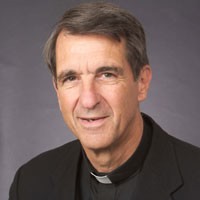 S.J., founder of Ignatius Press and student of Pope Benedict, joins us to break open the gift of insight and wisdom contained in this inspirational work of our Holy Father. As the Pope Benedict states in the preface in the 2nd edition of the book, that approach, taken in the book, puts the question of God and the question about Christ in the very center, which leads to a “narrative Christology” and demonstrates that the place for faith is in the Church. It is an excellent edition to all Christian libraries and a must for anyone seeking a richer appreciation of the teachings of faith. Pope Benedict uses the Old and New Testament, the teachings of the Fathers of the Church and generations of Saints, as well as the beauty of the Church’s Tradition to ponder the reality of Christ. It’s beautiful!
S.J., founder of Ignatius Press and student of Pope Benedict, joins us to break open the gift of insight and wisdom contained in this inspirational work of our Holy Father. As the Pope Benedict states in the preface in the 2nd edition of the book, that approach, taken in the book, puts the question of God and the question about Christ in the very center, which leads to a “narrative Christology” and demonstrates that the place for faith is in the Church. It is an excellent edition to all Christian libraries and a must for anyone seeking a richer appreciation of the teachings of faith. Pope Benedict uses the Old and New Testament, the teachings of the Fathers of the Church and generations of Saints, as well as the beauty of the Church’s Tradition to ponder the reality of Christ. It’s beautiful!
[powerpress]
For more information on this work as well as all the books by Joseph Cardinal Ratzinger (Pope Benedict XVI), go to www.ignatius.com
Tags: cardinal joseph ratizinger, catholic, catholic podcast, catholic prayer, cathollc spirituality, christian classic, Church, faith, ignatius press, introduction to christianity, joseph cardinal ratzinger, joseph fessio, pope benedict, pope benedict xvi, work
This entry was posted on Monday, April 4th, 2011 at 10:24 am
You can follow any responses to this entry through the RSS 2.0 feed.

